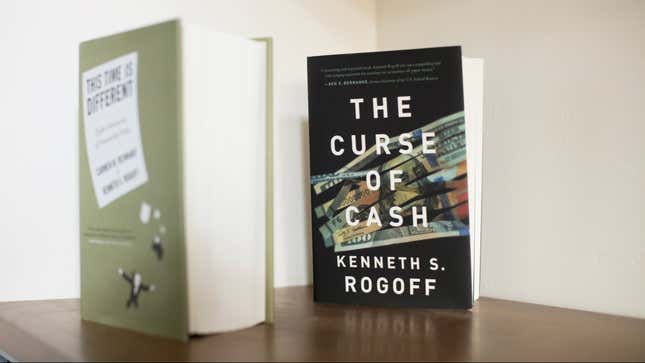Harvard professor Kenneth Rogoff has been a professional chess player, the chief economist for the International Monetary Fund, a Harvard professor, and the author of several seminal books about macroeconomics. It’s an impressive, if not particularly dangerous, career. That’s why the death threats were so jarring.
Rogoff’s latest book “The Curse of Cash” claims paper money fuels the underground economy and is widely used for tax evasion and other criminal activities, while central banks look the other way. It’s a strong position to take, but Rogoff didn’t expect the more than a dozen violent threats that wound up in his inbox. “A lot of the people who are against banning semi-automatic weapons are against banning $100 bills,” he said. “There’s a very big overlap.”
For some 20 years, Rogoff has argued that cash, especially high-value notes like the $100 bill, has worn out its welcome. The European Central Bank’s €500 note, after all, was known as the “Bin Laden” before it stopped issuing them.
But instead, the opposite is happening. Even though electronic transactions are steadily increasing, the amount of cash floating around has risen, too. Overall, cash in circulation as a share of GDP has crept higher in recent years. In the US, last year the $100 bill became the most popular note in circulation, beating out the $1 bill for the first time.
Rogoff argues that central banks don’t even know where much of the cash they print ends up. There are of course legitimate reasons to hold paper money. Some people simply don’t trust banks and there’s also overseas demand for US legal tender in countries that have unstable currencies. Others want to protect their privacy, or use cash to help with budgeting.
But for Rogoff, these explanations don’t come close to explaining the amount of paper money outstanding. And he says there is another good reason to move away from cash: A greater reliance on electronic money could give central banks more scope to control interest rates the next time there’s a severe economic downturn.
Quartz spoke to Rogoff about the response to his book, and whether his views have changed since he first published it two years ago. The conversation was edited and condensed for clarity.
Quartz: It seems like privacy is one of the thornier problems when it comes to an increasingly cashless society.
Rogoff: That’s actually why I had this very cautious, less exciting idea of less cash, [rather] than cash-less, at least for a very long time. My basic idea is you want to allow, if someone wants to buy something for a couple thousand dollars and not have anyone know about it, that’s one thing. If they want to buy a $40 million apartment in Trump Tower or pay off a bribe of $150,000 in cash, you want to make that hard.
Have you heard from policy makers about your book?
Absolutely. It’s a very awkward situation for central banks because, in private, those that have thought about it will recognize that they are basically engaged in what I call reverse money laundering. They take clean money and it ends up being dirty money. They’re sort of aware that this is a growing problem. On the other hand, the central banks make a lot of revenue from printing money. It makes them look like profit centers. They feel it strengthens their independence.
Some central bankers say, what will we do for money if we’re not printing money? In the modern financial system, there are so many ways central banks will make money. They’re still the providers of liquidity, they’re the providers of clearing. For goodness sake, the Federal Reserve made $80 billion last year printing, mostly, $100 bills. They don’t need $80 billion to cover their costs. They can make do with a few billion, I imagine. There are just lots of ways they can make money.
My prediction is that over time there will be a tipping point where cash—large bills especially—will have so little use in the legal economy that it starts becoming very difficult to launder it back into the economy. Stores won’t take them, people won’t want to have them—it’s just too suspicious. And at that point, the central banks are awkwardly going to find themselves having to buy it all back, carrying big losses on their books. But in natural life, all policymakers think if they can put the problem off to the next person, that’s very appealing.
Cash’s use in the underground economy doesn’t seem widely discussed in official statistics.
The central banks are very conflicted. The Federal Reserve has a payments research arm, on which perhaps they spend $1 million a year. Maybe. Can you think of another business that generates $80 billion in revenue, that spends $1 million researching where the demand is coming from? It’s corrupt. There are lots of ways we could have much better data on cash. For example, all cash seized in any crime, anything that goes to court, in the states, in Canada—I think it’s true in England—the cash is not only seized, you have to list the serial numbers of every dollar bill seized. If we had a central repository for the data, which would not be very difficult, that would be a nice statistic to have: how much has been seized?
I tell you, I get letters and emails from officials all the time saying, ‘Boy are you right. I have seized cash where it’s in $100 bills stuffed in walls, stuffed in shoe boxes, stuffed in safes. I’ve been a law enforcement officer in the Florida area for 30 years and it’s just ridiculous what goes on.’ But that data, they hide it. You can’t get it.

What about the idea that cash is a type of check on government? That it can help prevent the government from stopping speech it doesn’t like, for example?
I just think there’s a balance. There are other examples where there’s sort of a trade off. You make opioids legal, because it helps some people, but how legal do you want to make them? Basically if you look at the usage of cash in legal economy plummeting, printing of cash soaring, and the result of all these surveys, it reinforces the idea that things are a little out of whack.
How do we make sense of the amount of cash floating around versus the rise in digital payments?
If you look at the use of cash in the legal tax-compliant part of the economy—I wouldn’t say it’s collapsing, but it’s moving steadily down. Maybe 25 years ago the total value of cash transactions was 40% of all consumer transactions and some share of business transactions. It has steadily moved down to today where it’s probably 7 or 8% of the value of all consumer transactions and close to zero of all business transactions. There are countries like Sweden where those numbers are close to zero.
But the supply of cash is growing. The central banks are privacy providers, but mostly for tax evasion and illegal activity. I just think the whole purpose of it has changed, it’s been distorted, and it’s time to wake up to what cash is mostly used for.
The biggest use of cash—really, by far—in the world is in large scale real estate transactions where people are trying to launder money. You can find that in Mumbai, and Shanghai, and Moscow, but also Los Angeles, New York, Miami, Trump Tower.
Will governments have to push society into becoming cashless, or will it happen on its own?
It’s going to happen naturally because we’re seeing as superior transaction technologies come along, the use of cash is declining. And I think we’ll reach a tipping point where regardless, central banks are going to find themselves having to buy back a lot of the cash supply. But that could take three or four decades. I would just say, we’re doing a lot of damage now.
Is there any economic reason for a country to make sure it has the most advanced payment system? People in China, for example, seem proud of their tech. Is it just bragging rights?
It saves time; there are other advantages. For all the concerns about cyber security, there are quite a few scholarly papers now showing that crime goes down in poor neighborhoods to the extent that the government makes transfers electronically instead of by check, which gets cashed.
India found that by shifting to electronic, they have a much more efficient system for making transfers than they used to have, and also, critically, they have biometric identification of their bank accounts. Graft has been cut enormously. It’s just much harder to steal people’s money electronically. So there have been a lot of advances that are difficult to measure, but helpful.
Will cryptocurrencies like bitcoin be used in 10 years, or will they fade away?
I think cryptocurrencies in their anonymous form will have to get regulated away in the advanced countries. But there will be versions of them that are not anonymous that will be competitors for debit cards, credit cards—they’ll be an alternative transaction. But as regards the anonymous part: I think, at the moment, the government kind of looks the other way because they think there’s a lot of great technology coming out and they don’t want to get in the way. But once crypto reaches scale, you can’t allow people just to make large-scale payments effortlessly that the government can’t trace. It’s the cash problem on steroids.
